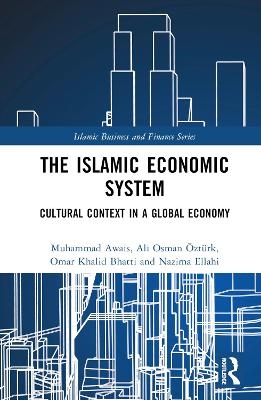
The Islamic Economic System
Routledge (Verlag)
978-1-032-77686-6 (ISBN)
Islamic Economics refers to financial aspects or monetary activities and processes, which adhere to Islamic standards and teachings. The Islamic Economic System relates to the hypothetical development of an economy whose individuals follow the Islamic faith. This book presents an interesting and timely narrative of the concepts of Islamic economics in the context of Islamic culture. Its purpose is to guide individuals and organizations towards a Shariah-based Islamic Economic System.
It begins by introducing the Islamic Economic System; its historical origins are explained in the framework of the verses of the Holy Quran, and in light of the Shariah scholars and the philosophical thinkers of the mid-20th century. It discusses concepts such as the evolution of Islamic Fintech and Artificial Intelligence (AI); the relationship between Islamic corporate governance and Islamic Economics; the distribution of wealth in Islam; Islamic Social Finance; Islamic Economic practices in the banking industry, behavioural norms and moral foundations; and Islamic Economics in Organisation of Islamic Cooperation (OIC) and non-OIC countries. The author emphasizes the principles that set Islamic economics apart from traditional systems, grounded in Shariah evidence and highlights the role of Islamic principles in promoting overall business success and ethical practices in the banking industry, offering comparative analysis between Islamic and conventional models, as well as economic systems. Drawing on a rich array of sources, including the Quran and interviews with renowned religious scholars, the book provides a well-rounded and thoroughly researched argument.
This book will serve as a valuable resource for academics, scholars, researchers, and organizations seeking to navigate the complexities of an interest-free economic system guided by Islamic principles.
Muhammad Awais is Associate Professor and Head of the Economics & Finance Department at Foundation University School of Science and Technology, Pakistan. Ali Osman Öztürk is Rector at Hitit University, Turkey. Omar Khalid Bhatti is Associate Professor of Management at Istanbul Medipol University, Turkey. Nazima Ellahi is Associate Professor of Economics & Finance at Foundation University Islamabad, Pakistan.
Introduction: Foundations of Islamic Economics 1. The Evolution of Islamic Fintech and Artificial Intelligence (AI) in Islamic Economics 2.The Relationship between Islamic Corporate Governance and Islamic Economics and Its Impact on Economic Matters 3. Distribution of Wealth in Islam 4. Islamic Transactions and Governance Principles 5. Islamic Social Finance with Incorporation of Islamic Fintech and Islamic Corporate Governance 6. Comparative Economic System 7. Islamic Approach to Contemporary Economic Problems 8. Islamic Economics Practices in the Banking Industry 9. Islamic Economic System: Behavioral Norms and Moral Foundation 10. Understanding Market Structure in Islamic Framework 11.The Islamic Economic System in Non-OIC & OIC Countries: Case Studies
| Erscheinungsdatum | 24.07.2024 |
|---|---|
| Reihe/Serie | Islamic Business and Finance Series |
| Zusatzinfo | 9 Tables, black and white; 16 Line drawings, black and white; 16 Illustrations, black and white |
| Verlagsort | London |
| Sprache | englisch |
| Maße | 156 x 234 mm |
| Gewicht | 512 g |
| Themenwelt | Sozialwissenschaften ► Soziologie ► Spezielle Soziologien |
| Wirtschaft ► Allgemeines / Lexika | |
| Wirtschaft ► Betriebswirtschaft / Management ► Marketing / Vertrieb | |
| Wirtschaft ► Volkswirtschaftslehre ► Makroökonomie | |
| ISBN-10 | 1-032-77686-2 / 1032776862 |
| ISBN-13 | 978-1-032-77686-6 / 9781032776866 |
| Zustand | Neuware |
| Informationen gemäß Produktsicherheitsverordnung (GPSR) | |
| Haben Sie eine Frage zum Produkt? |
aus dem Bereich


